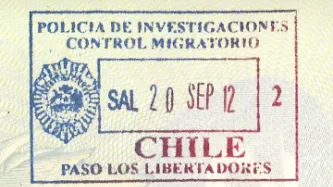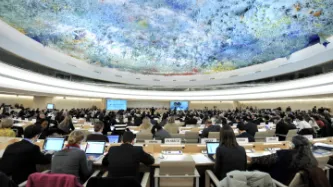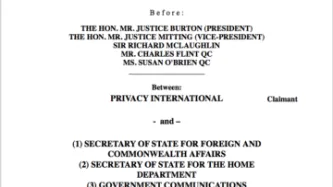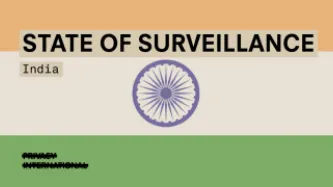Search
Content type: Advocacy
A new Privacy International report based on an international collaborative investigation carried out by 40 NGOs in 42 countries has found alarming weaknesses in the oversight arrangements that are supposed to govern the sharing of intelligence between state intelligence agencies, including in the UK. Privacy International urges governments to enact urgent reforms and improve public understanding about the scope of intelligence sharing and the safeguards and oversight currently in place.
Content type: Long Read
A major new report published today by Privacy International has identified alarming weaknesses in the oversight arrangements that are supposed to govern the sharing of intelligence between state intelligence agencies.
'Secret Global Surveillance Networks: Intelligence Sharing Between Governments and the Need for Safeguards' is based on an international collaborative investigation carried out by 40 NGOs in 42 countries.
Previously undisclosed documents obtained by PI via litigation in the…
Content type: Press release
Below is a joint statement from Privacy International and Bytes for All.
This Friday, 27 September, marks the conclusion of the 24th session of the UN Human Rights Council, a session which has, for the first time, seen issues of internet surveillance in the spotlight. Privacy International and Bytes for All welcome the attention given at the Human Rights Council to this issue. However, we are concerned about developments which took place that threaten privacy rights and freedom of…
Content type: News & Analysis
15 October 2014
The following was written by Carly Nyst, Legal Director for Privacy International, and originally appeared in the Guardian's Comment is Free section:
Until the fall of the Berlin wall in 1989, the East German state security service – the Stasi – conducted surveillance and kept files on a third of the country’s population. One of those people was activist and dissident Ulrike Poppe, whose communications and activities were spied on by Stasi operatives constantly for 15 years.…
Content type: Long Read
Privacy International is celebrating Data Privacy Week, where we’ll be talking about privacy and issues related to control, data protection, surveillance and identity. Join the conversation on Twitter using #dataprivacyweek.
Exercising the right to privacy extends to the ability of accessing and controlling our data and information, the way it is being handled, by whom, and for what purpose. This right is particularly important when it comes to control of how States perform these activities.…
Content type: News & Analysis
This comment by Privacy International Executive Director Gus Hosein ran in Ciper Chile on 19 May, 2014
The economic benefits of being included in the Visa Waiver Program (VWP) with the US are remarkable. The ease of travel allows for the exchange of tourism between the countries, and other new economic opportunities through reduced friction caused by visa approval processes. Nonetheless, this program is often used as a mechanism to seek more data on the citizenry of participating…
Content type: News & Analysis
2nd March 2015
UPDATE: Since the original publication of this post in early February, over fifty additional national and international human rights organisations have joined us and called on all governments to support the creation of a UN Special Rapporteur on the Right to Privacy.
This recent wave of support, bringing the total number up to 63, comes at a critical time. As the UN Human Rights Council begins its 28th session in Geneva today, the…
Content type: News & Analysis
This piece originally appeared in Open Democracy here.
As the UK Parliament returns from its summer break, everyone’s back to talking about Brexit. But there’s another policy of existential significance to our democracy that we really need to be talking about. I refer here to the innocuously named ‘Investigatory Powers Bill’. The House of Lords have been debating the ‘bulk powers’ — what we would call the mass surveillance measures — of the Bill over the recent days. We are literally…
Content type: News & Analysis
18 October 2013
The following is an excerpt from an article written that originally was published by IFEX, and is written by Carly Nyst, Head of International Advocacy at Privacy International:
The reality of the modern world is that governments – both of our own countries, and of foreign states – have greater capabilities to carry out invasive surveillance of citizens, no matter where they reside or what flag they pledge to. And caught in the cross-fire of the expanding surveillance…
Content type: Press release
Key points
Privacy International has obtained previously unseen government documents that reveal British spy agency GCHQ collects social media information on potentially millions of people.
GCHQ collected and accesses this information by gaining access to private companies’ databases.
Letters obtained by Privacy International reveal that the body tasked with overseeing intelligence agencies’ activities (the Investigatory Powers Commissioner) was kept in the dark as UK intelligence…
Content type: Press release
In today’s latest hearing in our ongoing legal challenge against the collection of massive troves of our personal data by the UK intelligence agencies, shocking new evidence has emerged about GCHQ’s attempts to yet again avoid proper independent scrutiny for its deeply intrusive surveillance activities.
In a truly breath-taking exchange of letters between the Investigatory Powers Commissioner’s Office (“IPCO”) and the Director of Legal Affairs at GCHQ, it has emerged that GCHQ have…
Content type: News & Analysis
On a hot day in Nairobi, our researcher is speaking to an officer of Kenya’s National Intelligence Service (NIS). The afternoon is wearing on and the conversation has turned to the presidential elections, taking place in August this year. He has just finished describing the NIS’ highly secret surveillance powers and the disturbing ways in which these powers are deployed.
“It is what you might call ‘acceptable deaths,’” he states about the misuse of communications surveillance powers. “People…
Content type: Press release
Privacy International has today published an investigation, which sheds light on the shady deals that built Syria’s surveillance state and the role Western companies have played in its construction. The investigation also shows how Western surveillance companies seek to exploit loopholes to do business with repressive states.
Key points:
Technical specifications acquired by Privacy International reveal the Syrian government’s ambitious mass surveillance projects, including a nationwide…
Content type: Long Read
This piece was written by Ashley Gorski, who is an attorney at the American Civil Liberties Union, and PI legal officer Scarlet Kim and originally appeared in The Guardian here.
In recent weeks, the Hollywood film about Edward Snowden and the movement to pardon the NSA whistleblower have renewed worldwide attention on the scope and substance of government surveillance programs. In the United States, however, the debate has often been a narrow one, focused on the…
Content type: Long Read
On 17 October 2016, the Investigatory Powers Tribunal handed down judgment in a case brought by Privacy International against the Foreign Secretary, the Home Secretary and the three Security and Intelligence Agencies (MI5, MI6 and GCHQ).
The case concerned the Agencies’ acquisition and use of bulk personal datasets (‘BPD’) – datasets that contain personal data about individuals, the majority of whom are unlikely to be of intelligence interest, such as passport databases and finance-related…
Content type: Press release
This week in Geneva, the UN Human Rights Committee will examine Colombia’s compliance with the International Covenant on Civil and Political Rights (ICCPR). This review, by a body of independent experts charged with monitoring compliance with the ICCPR, comes just weeks after the peace deal between President Juan Manuel Santos and Farc leader Timoleon Jimenez was rejected by voters and months after it was revealed that an investigative journalist was put under surveillance by the Colombian…
Content type: Long Read
This week, Privacy International, together with nine other international human rights NGOs, filed submissions with the European Court of Human Rights. Our case challenges the UK government’s bulk interception of internet traffic transiting fiber optic cables landing in the UK and its access to information similarly intercepted in bulk by the US government, which were revealed by the Snowden disclosures. To accompany our filing, we have produced two infographics to illustrate the…
Content type: Press release
Key points
Privacy International, Liberty, Amnesty International, and seven other human rights organizations challenge UK mass surveillance and UK access to US mass surveillance at the European Court of Human Rights
This is the first case before the European Court of Human Rights to directly challenge UK and US mass surveillance revealed by the Snowden disclosures
National courts and oversight bodies have failed to rein in mass surveillance practices that impact hundreds of millions of…
Content type: Long Read
Privacy International’s case on Bulk Personal Datasets and Bulk Communications Data comes to a head with a four-day hearing in the Investigatory Powers Tribunal which commenced on 26 July 2016.
The litigation has brought to light significant revelations about the use of section 94 of the 1984 Telecommunications Act to obtain bulk communications data.
Large amounts of disclosure have shed new light on this hitherto secret power and explained confusing aspects of the Government’s Response to…
Content type: News & Analysis
One of the most controversial aspects of the UK's Investigatory Powers Bill proposes the storing by ISPs and mobile network providers of 'Internet Connection Records' (ICRs). While vaguely defined, they will include your internet browsing history (although the Government is at pains to clarify that only the websites you visit, not the specific webpages on those websites will be stored), and what apps you have accessed, over the previous 12 months.
Clearly then ICRs are personal…
Content type: Press release
Today Sir Stanley Burnton, the Interception of Communications Commissioner, published a highly critical review of the use of Section 94 of the Telecommunications Act 1984 for gathering vast amounts of our communications data in bulk. This obscure clause pre-dates the internet era, but has been used for nearly two decades for mass surveillance. Today is the first time that these powers have been criticised by an independent statutory body. IOCCO is critical of the Government's use of these…
Content type: Press release
Tomorrow, on 26 July, the main hearing will begin in Privacy International's legal challenge against MI6, MI5, and GCHQ's collection of bulk communications data and bulk personal datasets. Previously secret documents will be made public at the hearing, and Privacy International will brief attending journalists about the significance of the disclosed documents.
The hearing will include references to important documents detailing the collection of data on every citizen in the…
Content type: Press release
Harmit Kambo, Campaigns Director, Privacy International said
"The overwhelming vote by MPs last night in favour of massively intrusive new state surveillance powers represents both a failure of the democratic process and a grim watershed moment for the privacy of every one of us.
Over the course of the Bill Committee stage, Privacy International, alongside experts from academia, technology firms, the legal profession, human rights organisations, and civil liberties groups have proposed over…
Content type: Press release
Privacy International releases previously confidential correspondence between lawyers for MI5 and GCHQ and the former Interception of Communications Commissioner, highlighting problems with the relationship between the two bodies
The correspondences show a lack of meaningful oversight and restraint of UK surveillance agencies
Ahead of the vital commons vote on the Investigatory Powers Bill, we need to create a system that guarantees better oversight of surveillance powers…
Content type: Press release
Despite Government attempts to stop 650 claims about surveillance being investigated, the Investigatory Powers Tribunal has today ruled that the cases can be heard
However, the Tribunal is requiring the 650 claimants to submit further information demonstrating that they are "potentially at risk" of unlawful surveillance, prior to investigating their claims of unlawful spying
The Tribunal has said that people outside the UK have no legal right to find out if British…
Content type: News & Analysis
This letter originally appeared here.
Dear Home Secretary
You are fortunate that the SNP and Labour Party courageously abstained from the vote on the Investigatory Powers Bill, content with government assurances that mass surveillance of British citizens is not government policy. Mass surveillance is not, and could never be, government policy. Merely government practice.
I congratulate you on your much-quoted claim that the Investigatory Powers Bill will contain a “world-leading…
Content type: News & Analysis
“It’s like 10,000 spoons when all you need is a knife”. Alanis Morissette thought that was ironic. I never thought so. I suggest a far more ironic lyric to you Alanis - "It’s like the Home Office not listening during a consultation about how it wants to listen to everything you do’. OK, it might not be the catchiest lyric, but you can’t say it’s not ironic.
Today the latest version of the Investigatory Powers Bill was published. The Government might want some credit…
Content type: News & Analysis
We already know that in some countries, like the UK, governments are drafting laws to legalise and legitimise their incredible surveillance powers. In the U.S. we are seeing legislation that is using remarkably similar language on encryption and surveillance. The next phase of the cryptowars has openly begun.
Yesterday what is being called the Feinstein-Burr decryption Bill was introduced into the US Senate and leaked online. Whilst the short title ‘Compliance with Court Orders…
Content type: Long Read
Written by: Centre for Internet and Society
This guest piece was written by representatives of the Centre for Internet and Society (CIS). It does not necessarily reflect the views or position of Privacy International.
Introduction
As part of the State of the Surveillance project, CIS conducted a review of surveillance law, policy, projects, and trends in India. Below we provide a snap shot of key legal provisions governing surveillance in India and touch on…
Content type: Long Read
“This is my personal opinion,” concedes Branko, a taxi driver in Skopje, the Republic of Macedonia's capital. “It was done by America to stop Putin building his gas pipe line through Macedonia.”
“This is just politics,” he advises, skeptically.
It's a common reaction to the wiretapping scandal in Macedonia. Beginning in February last year when opposition leader Zoran Zaev posted a series of wiretaps online that he called 'bombs' – they seemingly showed that for years the phone calls of some…
















